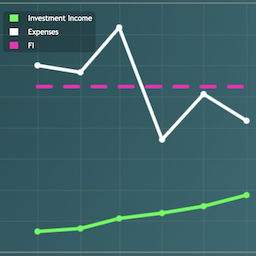To celebrate the release of JL Collins’ new book, Pathfinders, I collected all the best advice from his Financial Independence Podcast interviews!
JL has been on the show three times:
- First, back in 2012 (he was my second guest ever!)
- Second, when his hit book, The Simple Path to Wealth, was released
- Third, during the depths of the Coronavirus crash
That last interview may be my proudest moment as the Mad Fientist (I explain why during the show).
Hope you enjoy this jam-packed episode!
Listen Now
- Listen on Spotify or Apple Podcasts
- Download MP3 by right-clicking here
Highlights
- The power of FU Money and why it may be less money than you think
- JL’s biggest investing mistake and what he learned from it
- Why index investing is superior to active investing
- Are REITs and international funds necessary
- Why your house may not be a good investment
- Thoughts on stock picking and actively-managed funds
- What makes Vanguard unique and why it’s best for investors
- The three keys to becoming wealthy
- Lessons learned from Black Monday
- How to prepare for the next market crash
Show Links
- First Interview: JLCollinsNH – The Importance of F-You Money
- Second Interview: JL Collins – The Simple Path to Wealth
- Third Interview: Coronavirus Market Crash – Is This Time Different?
- JL’s Website – JLCollinsNH.com
- The Simple Path to Wealth
- How I Lost Money in Real Estate Before it was Fashionable
- Pathfinders: Extraordinary Stories of People Like You on the Quest for Financial Independence―And How to Join Them




Enjoyed the episode. Just curious if you guys know why Vanguard is often vilified along with Blackrock as controlling the world. It seems that people think Vanguard has people pulling strings with all its assets rather than being owned by all its investors and the market just doing what it does ( no doubt being manipulated by institutional investors and algorithms).
I believe the reason is because when individual investors buy into a Vanguard and/or BlackRock fund, they in turn go out and buy/own the individual stocks that make up the holdings within a particular fund. They do all the shareholder voting for each individual stock holding and they own large portions of most every major stock (relative to anyone else). Therefore the direction they vote (or just pressure the individual company board) has more impact that others.
So great! Thank you.
Environmental, Social, and Governance (ESG) investment strategies. Blackrock, Vanguard, State Street, and Goldman Sachs, for example, have enormous amounts of pooled investor’s money and they can effectively force organizations to go along with climate or woke social/political programming. They basically became social and political activists, not just purely financial investment firms. Vivek Ramaswamy is likely the best at articulating how and why it’s a problem if you want actual details.
Thanks! That’s infuriating.
That’s fantastic. I love ESGs. I don’t want my money invested in oil companies or the defense industry. I invest with Vanguard Social Index (VFTAX). It’s not only an ethical decision, it’s a financial one. I believe that oil companies will soon be less profitable. VFTAX is just a choice. I don’t understand why people argue that we can’t have choices. It’s about freedom and personal responsibility. Climate Change is a fact. It is already having effects on our economy. Using a word like “woke” in a financial context, signal an emotionally based decision, not based on facts, because it has no meaning. ESGs will make more money than non ESGs in the long term. This is fact based and Black Rock gets it.
Home bias still strong in America. In my opinion, reasonable passive investing should consist of global market, not a single country. Home bias ended badly for for example Japanese. As for added risk when investing internationally, it’s currency diversification, not risk. Holding everything in USD is a risk.
But, as pointed out by JL himself on a few occasions: If you own the S&P 500, you already have exposure outside the US. A lot of the big tech companies for example have a world wide presence etc.
I’m from Europe and I hold VWRL and VUSA etf’s in EURO and DOLLAR so that’s even more diverse, but not by much.
Which other currency apart from USD would you prefer to hold and why would that be your pick? :)
If you own Nikkei, Dax or SIX, you have exposure outsite Japan, Germany or Switzerland as well. A lot of global companies are listed there.
I’m also from Europe and I hold global stock index as well and I think that’s most reasonable. If someone lives in USA, works in USA and have a real estate in USA, adding US-only index (of companies earning mostly in USD) isn’t adding much of a diversification, is it? Why not diversify into global index?
JL Collins is my hero. Hearing him and reading The Simple Path to Wealth is what made me realize FIRE was possible.
Great post, really appreciate you putting it together!
Totally agree about JL’s comment on Vanguard.
On JL’s comment about stock-picking …
… it took the Trinity Study to confirm what Jack Bogle (CEO of Vanguard) agree with Buffett: it’s rare to beat the market, but every day-trader believes they can beat the market. :)
I worked for a multi-national investment firm about 15 years ago (, a firm that everyone would recognize the name). My job was to support the computer servers that powered the commodity desk’s analytics engine. This engine was powered by over 500 computer servers. I asked one of the computer programmers of this analytics engine what these servers were doing. He explained that the servers were a compute grid that combined the individual servers into a single, massively parallel system that executed hypo-trades based on algo’s. One server I had to triage ran off 1 TiB of memory — that’s an incredible amount of memory for a single computer in 2010 — compared to most trader’s Macs ran off 16MiB back then, megabytes for comparison. When combined into a grid, the system was running upto 500 TiB in memory — a staggering amount of computer memory. This huge grid of servers were churning on market data feeds to generate hypothetical trades, not even real trades, thinking 24×7 to notify the trading desks in each major market (New York, Tokyo, London). One day, the firm was being audited and I saw the computer hardware bill for running this commodities engine. I withdrew all my individual commodities and stock-picking that year. There was no way I could compete with the amount of $$$ the firm was shoveling into analysis of the markets. The firm had computer systems like this for each market: money markets, equities, and mortgage derivatives. I switched to funds. The only thing I now pick are CDs or bonds.
I told my brother-in-law this story and he still picks stock. O.O
Hi, I’ve been reading yours and JLCollins posts for a 7 years now. Not sure if you had answer this question in one of your posts or comments, but is there a specific tax planning software you use to help with Roth conversions, capital gains, or other tax situations that we don’t know about? Thank you!